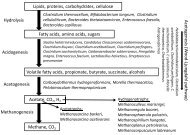Zymomonas mobilis - Biotechnology for Biofuels
Zymomonas mobilis - Biotechnology for Biofuels
Zymomonas mobilis - Biotechnology for Biofuels
You also want an ePaper? Increase the reach of your titles
YUMPU automatically turns print PDFs into web optimized ePapers that Google loves.
He et al. <strong>Biotechnology</strong> <strong>for</strong> <strong>Biofuels</strong> 2012, 5:75 Page 2 of 10<br />
http://www.biotechnology<strong>for</strong>biofuels.com/content/5/1/75<br />
metabolism, general stress response, trehalose metabolism,<br />
protein destination, ionic homoeostasis and an increase<br />
in the expression of many glycolysis and TCA<br />
cycle-associated genes, etc. [3]. Ogawa et al. identified<br />
271 genes with increased expression during ethanol<br />
stress of the ethanol tolerant mutant SR4-3 using microarray<br />
technology [13]. Yoshikawa et al. also found 359<br />
ethanol-specific genes by a comprehensive phenotypic<br />
analysis under ethanol stress in a collection of yeast<br />
strains with a single gene deletion [14].<br />
Compared with S. cerevisiae, there are relatively fewer<br />
studies regarding ethanol tolerance in bacteria. Gramnegative<br />
bacteria usually display an ethanol sensitive<br />
phenotype. In E. coli, ethanol act as a inhibitor of growth<br />
and metabolism, which changes its physical characteristics<br />
of cell membrane [15-17]. However, adaptive changes<br />
including membrane fatty acid composition, biosynthesis<br />
of fatty acid, lipids, peptidoglycan, and outer membrane<br />
proteins have reported in response to ethanol stress [17].<br />
For example, the ethanol tolerant mutants (LY01, LY02,<br />
and LY03) derivated from engineered E. coli KO11 by laboratory<br />
adaptive evolution method showed 50% survival<br />
rate when exposure to 10% ethanol [18].<br />
Ethanol is also act as a inhibitor of cell growth and<br />
metabolism in Z. <strong>mobilis</strong>, thus resulting in decrease in<br />
the rate of sugar conversion to ethanol [2]. Previous<br />
studies indicated that the lipid composition of Z. <strong>mobilis</strong><br />
may represent an evolutionary adaptation <strong>for</strong> survival in<br />
the presence of ethanol [19]. Further research on protein<br />
pattern found that differential expression of related proteins<br />
are involved in ethanol-shocked responses [20,21].<br />
However, no other studies have examined the response<br />
of Z. <strong>mobilis</strong> to ethanol stresses on genomic level. The<br />
first genome sequence <strong>for</strong> Z. <strong>mobilis</strong> ZM4 suggested that<br />
a sigma factor (σE, ZMO4104) may play an important<br />
role in resisting ethanol stress [22,23]. As a candidate<br />
ethanologenic microorganism <strong>for</strong> converting cellulosic<br />
biomass into ethanol or other valuable chemicals, Z.<br />
<strong>mobilis</strong> showed many desirable industrial characteristics<br />
<strong>for</strong> its special Entner-Doudoroff pathway [23]. Different<br />
engineered Z. <strong>mobilis</strong> strains have also been successfully<br />
constructed [24-27] to convert cellulosic biomass into<br />
ethanol. Importantly, the complete genome sequence of<br />
different Z. <strong>mobilis</strong> strains (such as ZM4, NCIMB11163,<br />
29192 and 10988, etc.) have been reported since 2005<br />
[22,28-30]. However, the physiological basis and genetic<br />
mechanisms involved in ethanol tolerance <strong>for</strong> Z. <strong>mobilis</strong><br />
are poorly understood. In order to develop new tolerant<br />
strains, the mechanisms of Z. <strong>mobilis</strong> in response to<br />
ethanol need to be examined and understood, which will<br />
provide new insight into tolerance mechanisms and aid<br />
future metabolic engineering and synthetic biology in<br />
ethanologenic strain improvement. With the completed<br />
genome from different Z. <strong>mobilis</strong> strains in hand,<br />
comparative genomics or global expression analysis<br />
should reveal ways to improve the per<strong>for</strong>mance of Z.<br />
<strong>mobilis</strong>, and more approaches to strain improvement<br />
will certainly be indentified in the future [23].<br />
In this study, microarray technology was used to investigate<br />
the expression profiling of the ethanologenic Z.<br />
<strong>mobilis</strong> in response to ethanol stress. The results showed<br />
127 genes were expressed up- or down-regulated. These<br />
data will help us to understand the molecular mechanisms<br />
and provide a global insight into strain improvement<br />
by metabolic engineering or synthetic biology.<br />
Results and discussion<br />
Profiling of cell growth and glucose utilization under<br />
ethanol stress<br />
The presence of 5.0% ethanol in the medium led to<br />
negative impacts on cell growth, glucose consumption of<br />
Z. <strong>mobilis</strong> ZM4 (Figure 1). In the ethanol untreated culture,<br />
maximal cell density (OD600) reached to 4.5 after<br />
approximately 24 h post-inoculation, while the time of<br />
Z. <strong>mobilis</strong> needed to reach its highest cell density of 2.62<br />
(OD600) delayed until 36 h after initial inoculation under<br />
ethanol stress conditions. Z. <strong>mobilis</strong> also consumed glucose<br />
more slowly under ethanol stress conditions, nearly<br />
90% of the initial glucose remaining after 24 h incubation.<br />
In opposite, almost of the glucose has been utilized<br />
at this time point under normal conditions. When Z.<br />
<strong>mobilis</strong> growth reached its peak after 36 h under stress<br />
conditions, 22% of the glucose also remained in the culture<br />
(Figure 1).<br />
Transcriptome comparision of Z. <strong>mobilis</strong> under normal<br />
and ethanol stress conditions<br />
Seo et al. describe the Z. <strong>mobilis</strong> ZM4 (ATCC31821)<br />
genome as consisting of a single chromosome and<br />
Figure 1 Z. <strong>mobilis</strong> fermentations under normal and ethanol<br />
stress conditions. The data come from mean values of triplicate<br />
experiments.



